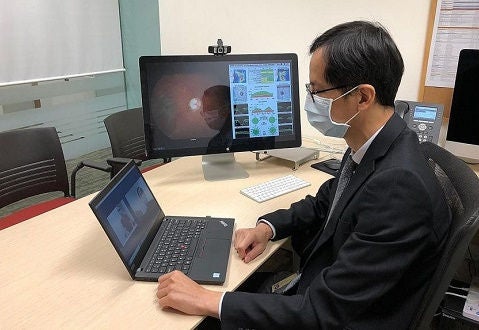
SINGAPORE - When security officer Joseph Mathew was asked by Ng Teng Fong General Hospital last year to consult his specialist about his varicose veins over a video call, he declined, preferring instead to keep his appointment at the hospital.
"Suddenly switching to telemedicine, videoconference and Zoom is very new to me, and I'm not ready for it," said Mr Mathew. Although the 59-year-old has attended meetings on Zoom, he finds it tough.
"There are certain things the doctor has to examine in person... And I'm not very tech-savvy," he added. He is not the only one who feels that way.
A survey by the Singapore Eye Research Institute (Seri) during the circuit breaker last year found that about 55 per cent of 520 people aged 60 and above were unlikely to use digital medical services if the Covid-19 pandemic continues.
Although half the respondents agreed that telemedicine would be helpful in reducing non-essential contact in clinics and hospitals, 77 per cent of them said they were uncomfortable with artificial intelligence (AI) interpreting their medical results.
But the study, which was conducted during the circuit breaker when telemedicine services became more common, found that seniors of higher income and education levels were more likely to use digital health services.
The findings highlight the need to improve digital health acceptance and adoption among the elderly as healthcare moves towards a new normal of safe distancing, concluded the study, which was published in May in Scientific Reports, a journal published by Nature.
"More needs to be done to engage and allay the fears, concerns and scepticism about digital health services, for patients who have never tried it before," said Professor Cheng Ching-Yu, head of the Ocular Epidemiology Research Group and Data Science Unit at Seri, and a co-principal investigator of the study.
"There is difficulty in engaging the older age group, unfortunately the group that we need to engage, as these are the ones suffering most from eye disease."
Empathising with seniors
Seeking healthcare online has become a more well-known option as a result of the pandemic.
In May alone, more than 8,000 teleconsultations were done by institutions under the National University Health System (NUHS), said Mr Peter Forbes, NUHS' group chief digital officer.
Before throwing out solutions to get more seniors on board with telemedicine, there is a need to empathise with them better, said Professor Josip Car, director of the Centre for Population Health Sciences at Nanyang Technological University's Lee Kong Chian School of Medicine.
"We can do more research on the barriers towards technological adoption... By analysing the statistics and understanding the elderly's experience and what they need, the better we can tailor our solutions," added Prof Car.
"It would be arrogant for us to assume that just because something works for a particular demography, technology or environment, it works for everything and everyone."
This is what the Singapore National Eye Centre (SNEC) is working on.
By the fourth quarter of this year, the centre will embark on quarterly digital readiness workshops for patients, said Clinical Associate Professor Anna Tan, SNEC's clinical director of low vision service.
Moreover, as the survey was conducted during the circuit breaker period last year, the Seri researchers plan to re-engage the 520 participants within this year and find out how their perceptions about telemedicine have shifted, said Assistant Professor Tham Yih Chung.
Prof Tham, a senior clinical research fellow at Seri and the other co-principal investigator of the study, added: "Hopefully, the digital acceptance and readiness among the elderly are now better than they were one year ago. If not, then we would need to identify the gaps."
Physiotherapy over Zoom
Telemedicine is not just limited to video consultations with doctors, phone calls, chatbots and AI.
Physiotherapy, rehabilitation, and even audiology services are being done over Zoom.
For instance, Ng Teng Fong General Hospital's audiology department offers tele-audiology services, which include connecting to a patient via a video call, and connecting to the patient's hearing device so that the audiologist can adjust the patient's hearing aid remotely.
Dr Gary Lee, the hospital's head of audiology, said patients aged 60 and above were seven times less likely to opt for tele-audiology sessions compared with younger patients.
"The most commonly cited reasons include tele-audiology features being too complicated, the lack of technological skills and a general preference for face-to-face consultations.
"(Elderly) patients are more likely to find it challenging to understand the concept of tele-audiology and manage the use of the features independently."
But Dr Lee observed that live demos in the hospital or clinic and technical support from caregivers make elderly patients feel more comfortable to use tele-audiology in follow-up sessions.
Dr Teng Gim Gee, head of Alexandra Hospital's chronic programme, said digital platforms or apps can be designed with older patients in mind, so that they will be more receptive to telemedicine.
"(These include) ease of access, intuitive design, larger font size, and simplifying the steps needed. For example, many have problems turning on audio upon launching Zoom."
Prof Car added: "Telemedicine at this stage should be about choice, convenience and creating some clear advantages for itself that go beyond just infection control, although that is also important."
He remains optimistic.
"Herd mentality and ease of access will change (people's) receptivity to these services. This is, in the same way, how most people now understand what it means to Google something, or Facebook someone, as compared to when the services first landed."
Contributed by














 Get it on Google Play
Get it on Google Play